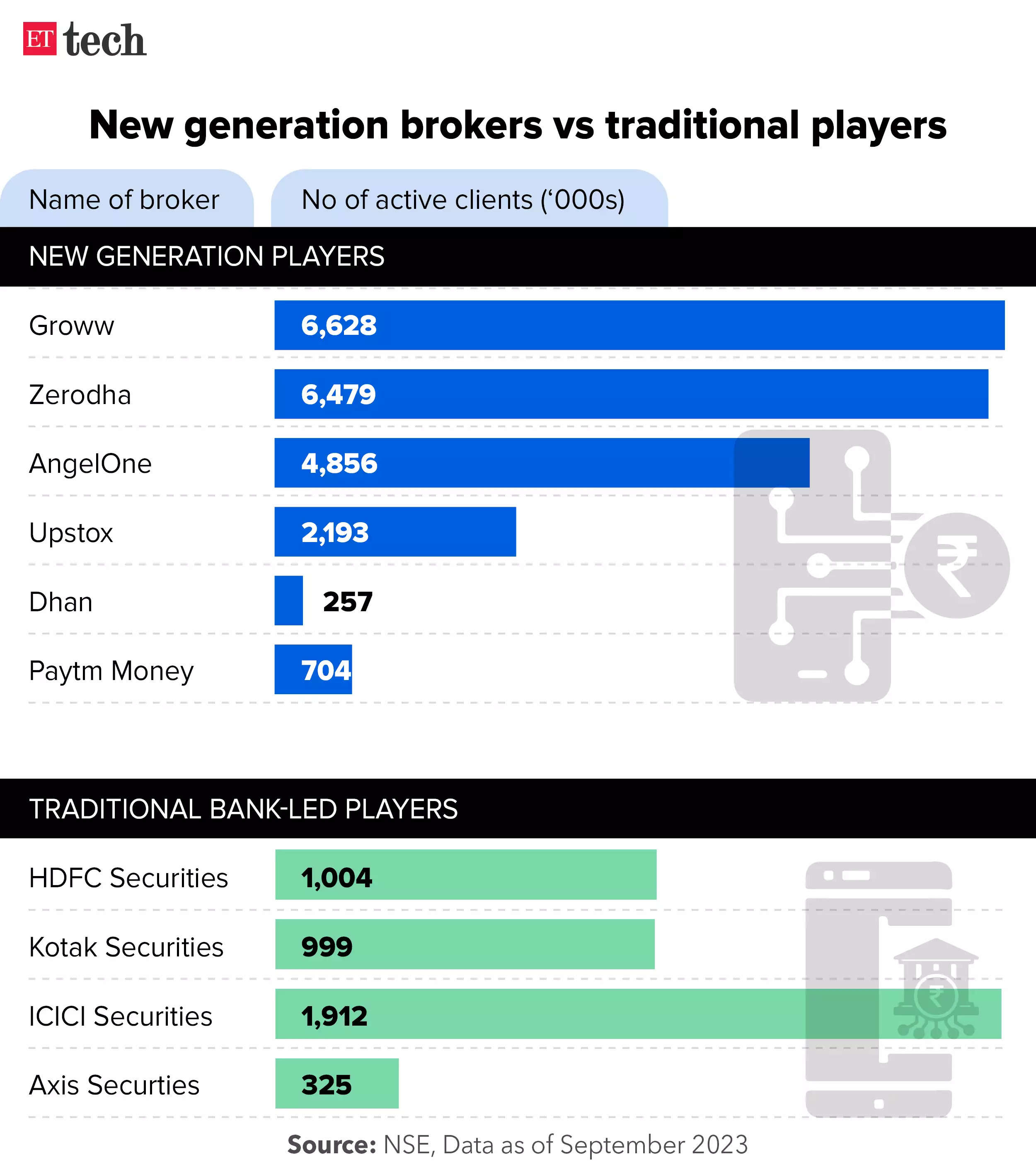Business News›Tech›Newsletters›Tech Top 5›Zerodha to end zero-brokerage model; Unacademy lays off 250 employees
 Daily Top 5 Daily Top 5 |
Zerodha to end zero-brokerage model; Unacademy lays off 250 employees
Want this newsletter delivered to your inbox?
I agree to receive newsletters and marketing communications via e-mail

Thank you for subscribing to Daily Top 5
We'll soon meet in your inbox.
Online stock broker Zerodha will likely discontinue its zero-brokerage structure due to new Sebi rules. More on this in today’s ETtech Top 5.
Also in this letter:
■ Zomato receives Esop approval
■ AI smartphone sales dull in India
■ GenAI & air travel turbulence
 Nithin Kamath, CEO, Zerodha
Nithin Kamath, CEO, Zerodha
Online stock broker Zerodha will have to end its zero-brokerage model and raise derivative trading fees due to new rules by market regulator Securities and Exchange Board of India (Sebi).
Driving the news: Zerodha cofounder and CEO Nithin Kamath said that after the Sebi mandated uniform brokerage charges that are not based on volumes, brokers, traders, and investors will be significantly impacted.
“We were one of the last remaining brokers that offered free equity delivery trades,” Kamath said. “With the new circular, we will, in all likelihood, have to let go of the zero brokerage structure and/or increase brokerage for F&O trades.”
He also anticipated a change in the pricing of other players.

New rules: Stock exchanges charge a lower fee to brokers if they generate high volumes, and brokers then charge traders little to no fees. This has led to a surge in trading across segments like derivatives, which the market regulator wants to control. The new fee structure kicks in from October.
Zoom out: Kamath said the revenue impact on Zerodha could be 10%, and 10%-50% for the industry. We have been reporting on how tech-first stockbrokers are adding customers in spades and generating strong revenues and profits.
Discount brokers are favourites for new-generation customers who prefer the ease of use and do-it-yourself (DIY) approach of such platforms.
Read our in-depth coverage of the rise of new-age stock brokers:
 Gaurav Munjal, cofounder, Unacademy
Gaurav Munjal, cofounder, Unacademy
SoftBank-backed edtech startup Unacademy has fired 250 employees in fresh layoffs across the company, sources aware of the matter said.
Around 100 people from core functions like business development and marketing have been laid off, while the rest are from sales. The company confirmed the layoffs.
Company statement: “As part of our ongoing efforts to streamline operations and enhance business efficiency, we have recently undergone a restructuring exercise. This was necessary, keeping in mind the company's goals and vision for the year, as we focus all our efforts on sustainable growth and profitability. Consequently, some roles have been impacted,” the edtech startup said in a statement.
Also read: How Unacademy board tweaked targets for founders’ voting rights
Startup layoffs: We reported on June 16 that Indian startups have laid off about 10,000 employees so far in 2024, with funding across stages continuing to be constrained. Over the past six months, venture capital-funded firms like Swiggy, Ola, Cultfit, Licious, PristynCare, and Byju’s have all fired employees in a bid to cut costs.
Tell me more: ET reported earlier this year that Flipkart was cutting 5-7% of its workforce, totalling 1,100-1,500 employees, while Paytm has been consistently firing staff as part of restructuring, having fired at least 1,000 employees.
Swiggy fired at least 400 employees, while IPO-bound Ola Electric is in the final stages of laying off over 600 employees after sister company Ola Cabs fired around 200 workers in late April.
Also read: How startups are changing their hiring strategies to streamline costs
 Deepinder Goyal, CEO, Zomato
Deepinder Goyal, CEO, Zomato
Zomato’s shareholders approved a new employee stock ownership plan (Esop), which the firm has said should be adequate for five years, and has given up ambitions to win a non-banking financial company (NBFC) licence from the Reserve Bank of India (RBI), the firm said in two separate filings with stock exchanges.
Renewing benefit: Over 75% of the shareholders participating in the vote approved the new Esop, which will see the issue of 183 million shares, diluting the company’s stakeholding by 2%. The new shares would be worth Rs 3,742 crore, as per the stock’s closing price of Rs 204.05 on the BSE on Monday.
Ending banking ambitions: On Tuesday, Zomato, in a stock exchange filing, said it was withdrawing its application to register as an NBFC as it did “not wish to pursue the lending/credit business anymore”. It added that the withdrawal would not have any material impact on the firm.
Extra motivation: The new Esops would help “create a ‘founder mindset’ amongst senior employees, which ultimately drives the right outcomes for long-term shareholder value creation,” cofounder Deepinder Goyal had said in the letter proposing the Esop plan in May.
Payments a tough business: When giving up its payment aggregator (PA) licence in May, Zomato had said that it did not have a “significant competitive advantage against the incumbents in the payments space”, which made the venture commercially unviable. At the same time, the RBI has been tightening norms in the space, including suggesting stricter KYC norms for PA licence holders.

Generative AI-capable smartphones are expected to comprise only 4-5% of the estimated 152-156 million total smartphone shipments in India this calendar year, indicating a slow start for the segment.
Tell me more: Globally, AI smartphones are expected to comprise 17% of total shipments of 1.2 billion handsets in 2024, according to market research firms. More brands are starting to invest in creating awareness and finding relevant use cases for consumers.
Price pain: Analysts believe the prevailing high prices will deter AI smartphones from becoming widely popular in India, unlike in other markets like China, South Korea, and Japan.
AI-capable smartphones or those using large-scale, pre-trained GenAI models for creating original content or performing context-aware tasks are costlier than other smartphones, with a starting price of $600, hindering their widespread acceptance.
Counterpoint Research said 2025 will be the inflection point for AI phones as it permeates broader price segments, especially in the $400-600 price band.
Should you rush to buy an AI phone? “We are still in the early innings of consumer AI. India's AI smartphone market is poised to grow, driven by rising consumer awareness around AI-capable phones and the debut of new feature-rich AI smartphones,” said Prabhu Ram, head, industry intelligence group, Cybermedia Research.

Customer satisfaction in the civil aviation sector has sunk to an all-time low owing to flyers frequently reporting harrowing experiences — from being stranded for hours to missing baggage to poor onboard food quality. Can artificial intelligence (AI) become a pick-me-up for the beleaguered sector?
AI might be the key: Airline executives said generative AI can transform the sector with end-to-end solutions for greater efficiency and hyper-personalisation for customers.
Players like Air India, IndiGo and Vistara are undertaking AI initiatives like conversational customer chatbots and use them to make the on-ground customer experience smoother.
Customer service: IndiGo’s multilingual conversational booking channel 6Eskai has reduced workload by as much as 75% for customer service agents and has notably enhanced customer engagement, the airline said.
Air India’s GPT-powered GenAI chatbot Maharaja, renamed AI.g, has so far addressed two million customer queries without using contact center agents, higher than any other airline globally, chief digital and technology officer Satya Ramaswamy said.
Similarly, Vistara launched the V-GyanAI chatbot less than a year ago to lend a hand to aircraft maintenance engineers, who earlier, had to go through massive reams of servicing guidelines and manuals.
Quote unquote: “AI is one of the unique technologies that is poised to have a profound impact on all aspects of our personal lives, businesses, and societies at large,” said Neetan Chopra, chief digital and information officer at IndiGo.
Also read: Opinion: India's AI journey should follow a path of open innovation guided by strong governance
Today’s ETtech Top 5 newsletter was curated by Riya Roy Chowdhury in Bengaluru and Megha Mishra in Mumbai.
Also in this letter:
■ Zomato receives Esop approval
■ AI smartphone sales dull in India
■ GenAI & air travel turbulence
Nithin Kamath says Zerodha to end zero-brokerage model after Sebi order

Online stock broker Zerodha will have to end its zero-brokerage model and raise derivative trading fees due to new rules by market regulator Securities and Exchange Board of India (Sebi).
Driving the news: Zerodha cofounder and CEO Nithin Kamath said that after the Sebi mandated uniform brokerage charges that are not based on volumes, brokers, traders, and investors will be significantly impacted.
“We were one of the last remaining brokers that offered free equity delivery trades,” Kamath said. “With the new circular, we will, in all likelihood, have to let go of the zero brokerage structure and/or increase brokerage for F&O trades.”
He also anticipated a change in the pricing of other players.

New rules: Stock exchanges charge a lower fee to brokers if they generate high volumes, and brokers then charge traders little to no fees. This has led to a surge in trading across segments like derivatives, which the market regulator wants to control. The new fee structure kicks in from October.
Zoom out: Kamath said the revenue impact on Zerodha could be 10%, and 10%-50% for the industry. We have been reporting on how tech-first stockbrokers are adding customers in spades and generating strong revenues and profits.
Discount brokers are favourites for new-generation customers who prefer the ease of use and do-it-yourself (DIY) approach of such platforms.
Read our in-depth coverage of the rise of new-age stock brokers:
- The rise & rise of new-age stock brokers
- New-age brokers ride on futures option to the bank
- Stock broking startups Groww, Upstox eye lending, payments to expand revenue base
- Full-service brokers see exodus of clients to discount players
- Groww posts massive jump in FY23 revenue, but expenses climb too
- Fintechs add 1.3 million new mutual fund SIPs in November, almost half of overall industry
Unacademy fires 250 in fresh layoffs

SoftBank-backed edtech startup Unacademy has fired 250 employees in fresh layoffs across the company, sources aware of the matter said.
Around 100 people from core functions like business development and marketing have been laid off, while the rest are from sales. The company confirmed the layoffs.
Company statement: “As part of our ongoing efforts to streamline operations and enhance business efficiency, we have recently undergone a restructuring exercise. This was necessary, keeping in mind the company's goals and vision for the year, as we focus all our efforts on sustainable growth and profitability. Consequently, some roles have been impacted,” the edtech startup said in a statement.
Also read: How Unacademy board tweaked targets for founders’ voting rights
Startup layoffs: We reported on June 16 that Indian startups have laid off about 10,000 employees so far in 2024, with funding across stages continuing to be constrained. Over the past six months, venture capital-funded firms like Swiggy, Ola, Cultfit, Licious, PristynCare, and Byju’s have all fired employees in a bid to cut costs.
Tell me more: ET reported earlier this year that Flipkart was cutting 5-7% of its workforce, totalling 1,100-1,500 employees, while Paytm has been consistently firing staff as part of restructuring, having fired at least 1,000 employees.
Swiggy fired at least 400 employees, while IPO-bound Ola Electric is in the final stages of laying off over 600 employees after sister company Ola Cabs fired around 200 workers in late April.
Also read: How startups are changing their hiring strategies to streamline costs
Zomato receives Esop approval; ends NBFC licence pursuit

Zomato’s shareholders approved a new employee stock ownership plan (Esop), which the firm has said should be adequate for five years, and has given up ambitions to win a non-banking financial company (NBFC) licence from the Reserve Bank of India (RBI), the firm said in two separate filings with stock exchanges.
Renewing benefit: Over 75% of the shareholders participating in the vote approved the new Esop, which will see the issue of 183 million shares, diluting the company’s stakeholding by 2%. The new shares would be worth Rs 3,742 crore, as per the stock’s closing price of Rs 204.05 on the BSE on Monday.
Ending banking ambitions: On Tuesday, Zomato, in a stock exchange filing, said it was withdrawing its application to register as an NBFC as it did “not wish to pursue the lending/credit business anymore”. It added that the withdrawal would not have any material impact on the firm.
Extra motivation: The new Esops would help “create a ‘founder mindset’ amongst senior employees, which ultimately drives the right outcomes for long-term shareholder value creation,” cofounder Deepinder Goyal had said in the letter proposing the Esop plan in May.
Payments a tough business: When giving up its payment aggregator (PA) licence in May, Zomato had said that it did not have a “significant competitive advantage against the incumbents in the payments space”, which made the venture commercially unviable. At the same time, the RBI has been tightening norms in the space, including suggesting stricter KYC norms for PA licence holders.
AI smartphone sales likely to be dull in India in 2024

Generative AI-capable smartphones are expected to comprise only 4-5% of the estimated 152-156 million total smartphone shipments in India this calendar year, indicating a slow start for the segment.
Tell me more: Globally, AI smartphones are expected to comprise 17% of total shipments of 1.2 billion handsets in 2024, according to market research firms. More brands are starting to invest in creating awareness and finding relevant use cases for consumers.
Price pain: Analysts believe the prevailing high prices will deter AI smartphones from becoming widely popular in India, unlike in other markets like China, South Korea, and Japan.
AI-capable smartphones or those using large-scale, pre-trained GenAI models for creating original content or performing context-aware tasks are costlier than other smartphones, with a starting price of $600, hindering their widespread acceptance.
Counterpoint Research said 2025 will be the inflection point for AI phones as it permeates broader price segments, especially in the $400-600 price band.
Should you rush to buy an AI phone? “We are still in the early innings of consumer AI. India's AI smartphone market is poised to grow, driven by rising consumer awareness around AI-capable phones and the debut of new feature-rich AI smartphones,” said Prabhu Ram, head, industry intelligence group, Cybermedia Research.
Bot voyage: Can GenAI-based innovation ease turbulence in air travel?

Customer satisfaction in the civil aviation sector has sunk to an all-time low owing to flyers frequently reporting harrowing experiences — from being stranded for hours to missing baggage to poor onboard food quality. Can artificial intelligence (AI) become a pick-me-up for the beleaguered sector?
AI might be the key: Airline executives said generative AI can transform the sector with end-to-end solutions for greater efficiency and hyper-personalisation for customers.
Players like Air India, IndiGo and Vistara are undertaking AI initiatives like conversational customer chatbots and use them to make the on-ground customer experience smoother.
Customer service: IndiGo’s multilingual conversational booking channel 6Eskai has reduced workload by as much as 75% for customer service agents and has notably enhanced customer engagement, the airline said.
Air India’s GPT-powered GenAI chatbot Maharaja, renamed AI.g, has so far addressed two million customer queries without using contact center agents, higher than any other airline globally, chief digital and technology officer Satya Ramaswamy said.
Similarly, Vistara launched the V-GyanAI chatbot less than a year ago to lend a hand to aircraft maintenance engineers, who earlier, had to go through massive reams of servicing guidelines and manuals.
Quote unquote: “AI is one of the unique technologies that is poised to have a profound impact on all aspects of our personal lives, businesses, and societies at large,” said Neetan Chopra, chief digital and information officer at IndiGo.
Also read: Opinion: India's AI journey should follow a path of open innovation guided by strong governance
Today’s ETtech Top 5 newsletter was curated by Riya Roy Chowdhury in Bengaluru and Megha Mishra in Mumbai.
Want this newsletter delivered to your inbox?
I agree to receive newsletters and marketing communications via e-mail

Thank you for subscribing to Daily Top 5
We'll soon meet in your inbox.
